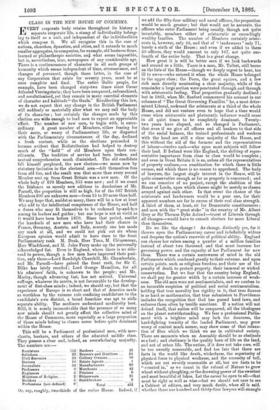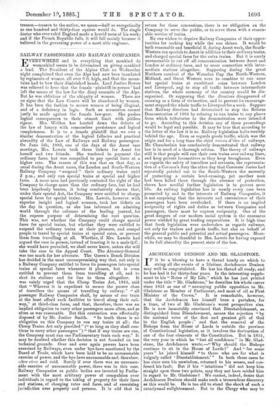CLASS IN THE NEW HOUSE OF COMMONS.
-LIVERY corporate body retains throughout its history a VA separate corporate life, a stamp of individuality belong- ing to itself as a unit, and independent of the individualities which compose it. We all recognise this in the case of nations, churches, dynasties, and cities, and it extends to mach smaller aggregates, to companies, for example, old business firms, learned or philanthropic societies, and what seems impossible, but is, nevertheless, true, newspapers of any considerable age. There is a continuousness of character in all such groups of humanity which seems independent of time, circumstance, and changes of personnel, though these latter, in the case of any Corporation that exists for seventy years, must be at once complete and final. The entire Gallic people, for example, have been changed sixty-two times since Caesar defeated Vereingetorix ; they have been conquered, enfranchised, and revolutionised, yet they remain in many essential elements of character and habitude" the Gauls." Recollecting this law, we do not expect that any change in the British Parliament will suddenly or materially alter what we may call the body of its character ; but certainly the changes made by this election are wide enough to lead men to expect an appreciable effect. Ths number of new men, to begin with, is extra- ordinary. A great number of Members, either fearing for their seats, or weary of Parliamentary life, or disgusted with the Parliamentary circumstances of the day, declined a fresh contest, while as the elections proceeded it became evident that Redistribution had helped to destroy much of the "hold " of old Members upon their con- stituents. The tradition of service had been broken, and mutual comprehension much diminished. The old candidate felt himself perplexed, the new electors—we mean new by statutory inclusion in the electoral area—felt themselves free from old ties, and the result was that more than every second Member sent up from Great Britain was a new man. Of the whole body of 670 Members, 355 were new ; and if we count the Irishmen as merely new editions in duodecimo of Mr. Parnell, the proportion is still as high, for of the 567 British Members 300 are unknown men—from 15 to 20 more than half. We may hope that, amidst so many, there will be a few at least who add to the intellectual competence of the House, and half a dozen who may fit themselves to be reckoned by-and-bye among its leaders and guides ; but our hope is not so vivid as it would have been before 1870. Since that period, amidst the hundreds of new men who have had their chance in France, Germany, Austria, and Italy, scarcely one has made any mark at all, and we could not pick out six whom European opinion would admit to have risen to the front Parliamentary rank. M. Deak, Herr Tisza, M. Clemenceau, Derr Windthorat, and M. Jules Ferry make up the universally 'acinowledged list. Even in England, where there is no aide- road to power, though a few men have improved their posi- tion, only three—Lord Randolph Churchill, Mr. Chamberlain, and Mr. Parnell—have gained the front rank, for Sir C. Dilke has lately receded ; Lord George Hamilton, for all his admirers' faith, is unknown to the people ; and Mr. Morley, though advancing fast, has not arrived. Universal suffrage, whatever its merits, is not favourable to the develop- ment of first-class minds ; indeed, we should say, but that the experience of Europe is so short and that of America made so worthless by the ruinous rule confining candidature to the candidate's own district, a broad franchise was apt to stifle separate ability. The mediocre understand mediocrity best. Still, it is nearly inconceivable that the presence of so many new minds should not greatly affect the collective mind of the House of Commons, more especially as a large proportion of those minds belong to classes never before quite dominant within the House.
This will be a Parliament of professional men, with mer- chants, bankers, and others of the educated middle class. They possess a clear and, indeed, an overwhelming majority.
The numbers are
Barristers
112 Bankers 25 Solicitors 22 Brewers and Distillers ... 24 Civil Servants 23 Colliery Owners 16 Doctors 16 Estate Agents 4 Journalists 34 Manufacturers 69 Professors 9 Merchants 42 Engineers 6 Printers 6 Ministers of Religion 2 Shipowners 21 Builders 6 Stockbrokers 6 Professions(not defined) 9 Total ..... 452
Or, say, roughly, two-thirds of the entire House. Indeed, if we add the fifty-four military and naval officers, the proportion would be much greater ; but that would not be accurate, the officers who enter Parliament being usually, though not quite invariably, members either of aristocratic or exceedingly wealthy families. The number of Members certainly- aristo- crats is, however, only 46, and that of " landowners " only 71, barely a sixth of the House ; and even if we added to them 50 officers, they would amount to only 167, not quite one- fourth of the entire body. That is a great change.
How great it is will be better seen if we look backwards and around us a little. Tnere is a man, Mr. Talbot, still borne on the lists of the House—though we deeply regret to hear, too ill to serve—who entered it when the whole House belonged to the upper class ; the Peers, the great, squires, and a few rich men directly nominating a clear majority, while of the remainder a large section were penetrated through and through with aristocratic feeling. That proportion gradually declined ; but in 1863, when Mr. Sanford commenced his account in our columns of " The Great Governing Families," he, a most deter- mined Liberal, reckoned the aristocrats at a third of the whole House, and did not venture even to hope that a time would come when aristocratic and plutocratic influence would cease in all quiet times to be completely dominant. Twenty- two years have elapsed, and so changed is Parliament, that even if we give all officers and all bankers to that side of the social balance, the trained professionals and workers with the head are still a clear majority of the House, and this without the aid of the farmers and the representatives of labour—twelve each—who upon most subjects will follow their lead. If Ireland were like England, the shifting of repre- sentative importance from class to class would be complete ; and even in Great Britain it is so, unless all the representatives of property coalesce,—a combination for which there is little excuse, and which there is no reason to apprehend. The body of lawyers, the largest single interest in the House, will be quite conservative enough as far as property is concerned ; and we can conceive of no project, except the abolition of the House of Lords, upon which classes might be merely as classes arrayed against each other. In that event the chance of the aristocrats and landowners would be a poor one, for their apparent numbers are far in excess of their real class strength. A third of them, at least, sit for Democratic constituencies ; and men with the "great stake" in the country of Mr. Albert Grey or Sir Thomas Dyke Acland—truest of Liberals through all changes—would have to consult electors far more Liberal than themselves.
Do we like the change ? As change, distinctly yes, for it throws open the Parliamentary career and indefinitely widens and deepens the nation's reservoir of political ability. England can choose her rulers among a quarter of a million families instead of about two thousand, and that must increase her governing power, and the capacity of her Parliament for new ideas. There was a certain narrowness of mind in the old Parliaments which conduced greatly to their extreme, and upon certain points, such as religious freedom and their use of the penalty of death to protect property, their immoral or wicked conservatism. But we fear that the country being England, we shall pay for greater width by a certain increase of weak- ness. The old men were not sentimentalists, and we confess to an incurable suspicion of political and social sentimentalism, holding that true morality has rigidity in it, that true finance is as hard as mathematics, that true submission to Providence includes the recognition that God has passed hard laws, and enforces them often by terrific sanctions. If a nation will not defend itself, that nation will be conquered, all the ideologues on the planet notwithstanding. We fear a professional Parlia- ment with a brighter mind may lack the dourness, the hard-fighting tenacity of the landed Parliament, may grow weary of contest much sooner, may show some of that relaxa- tion of fibre which we think we see in cultivated society. There are moments when an Assembly should be as obstinate as a fact ; and obstinacy is the quality born of life on the land, and not of urban life. The nation, if it does not take care, will be too sweetly reasonable, and find too late that there are facts in the world like death, wickedness, the superiority of physical force to physical weakness, and the necessity of toil, which are not sweetly reasonable at all, but are facts to be " counted in," as we count in the refusal of Nature to grow wheat without ploughing, or the drowning power of the sweetest and most beautiful of lakes. Let the career be open to all—that must be right as well as wise—but we should not care to see a Cabinet of editors, and very much doubt, when all is said, Whether those one hundred and thirty-four lawyers will strangle treason—treason to the nation, we mean—half as energetically as one hundred and thirty-four squires would do. The single doctor who ever ruled England made a horrid mess of his work; and if the French Republic falls, it will fall mainly because it believed in the governing power of a most able engineer.











































 Previous page
Previous page